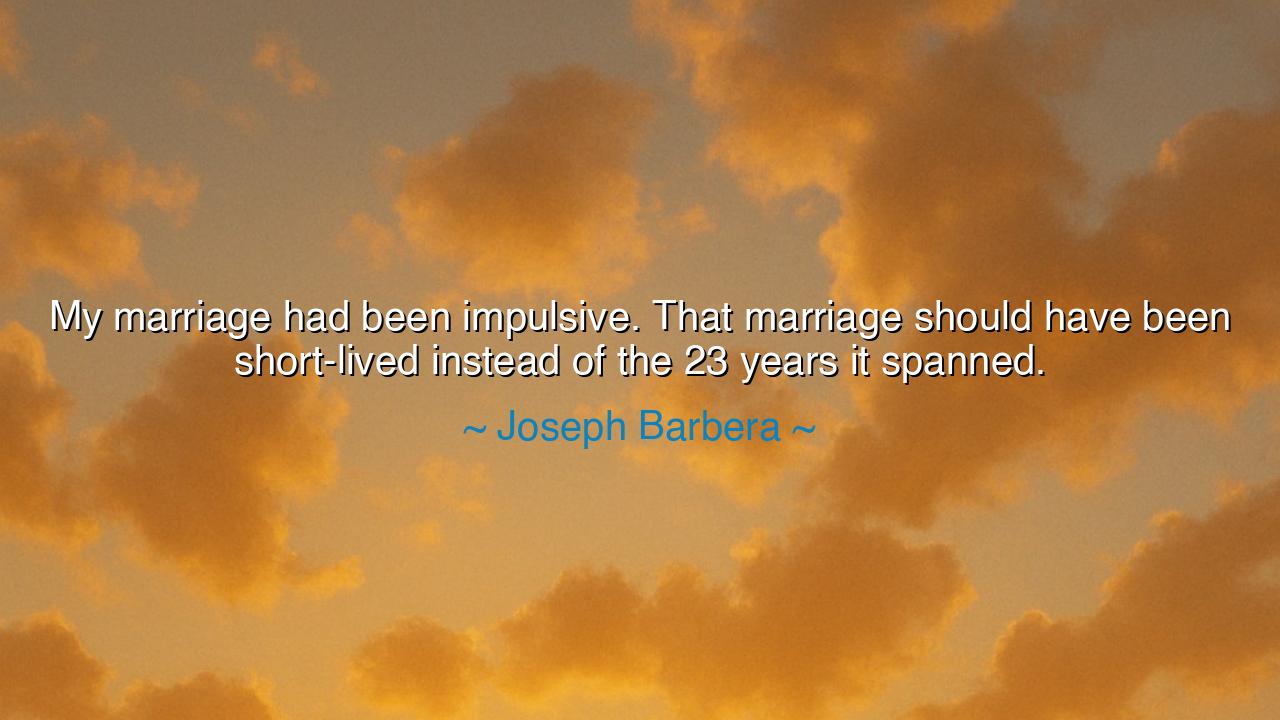
My marriage had been impulsive. That marriage should have been
My marriage had been impulsive. That marriage should have been short-lived instead of the 23 years it spanned.






O children of the future, gather close, for I bring you the words of Joseph Barbera, a man whose reflection on marriage offers a deep insight into the nature of love, commitment, and the lessons we learn through life. He said, "My marriage had been impulsive. That marriage should have been short-lived instead of the 23 years it spanned." These words, though spoken in retrospect, reveal the wisdom of one who has seen the complexity of relationships—how impulses can drive us into commitments that may not be grounded in the deep understanding and preparation necessary for lasting love. It is a lament for the fact that some decisions, made hastily in the heat of the moment, carry us down paths we might later wish to have avoided.
In the ancient world, marriage was often seen not only as a union of hearts but as a contract—a bond forged by the needs of family, power, and dynasty. The Romans, for example, understood the importance of marriage in solidifying political and social ties. While love might have been part of the equation, it was often secondary to the practical considerations of alliance and inheritance. Even in the great tales of Greek mythology, such as the union of Hera and Zeus, we see that marriage was often tied to the larger forces of the universe—gods and mortals alike were bound together not by their impulses, but by forces much greater than themselves. Barbera’s words remind us that even in ancient times, the idea of marriage as a thoughtful, deliberate choice was often overshadowed by societal expectations.
The impulsiveness of Barbera's marriage speaks to a human tendency that transcends time—the urge to rush into decisions without fully understanding their consequences. The philosopher Socrates often spoke of the importance of deliberation and wisdom in all things, for without them, one could easily find themselves lost in the maze of emotions and desires that cloud reason. Socrates believed that the key to a good life was the thoughtful examination of one’s actions, particularly in matters as significant as marriage. To rush into a union without true understanding, he warned, is to court potential regret. Barbera’s own reflection on his impulsive marriage echoes this wisdom—that hasty decisions often lead to outcomes that could have been avoided with more careful thought.
Consider the ancient story of Heloise and Abelard, whose love and marriage were impulsive and passionate but ultimately tragic. Abelard, a famous scholar, and Heloise, a brilliant and educated woman, fell in love quickly, without considering the consequences of their actions. Their relationship led to scandal, public humiliation, and ultimately separation. Despite their deep love for each other, their impulsive decision brought them sorrow rather than lasting happiness. This story, though rooted in the past, is not unlike Barbera’s own reflection—the realization that some decisions, made too hastily, can result in prolonged suffering.
In the modern world, the impulsiveness of marriage can still be a common thread. Barbera’s acknowledgment that his own marriage should have been shorter serves as a lesson for us all—one that urges caution in matters of the heart. Marriage is a significant commitment that requires more than just impulse or emotion; it demands careful thought, understanding, and mutual respect. Just as Socrates and other great philosophers advised, we must approach marriage with the full awareness of its responsibilities and consequences. It is not enough to follow the whims of the heart without considering the path that lays ahead.
The lesson in Barbera’s words is one of wisdom and patience. In our search for love and companionship, we must resist the urge to rush into relationships based solely on impulse. Marriage should be built on the foundation of mutual understanding, shared values, and deep connection—not just the rush of desire or fleeting moments of infatuation. Barbera’s reflection urges us to take the time to truly understand our partners, to deliberate on the nature of our commitments, and to avoid making decisions that are driven by emotion alone.
So, children, let this wisdom guide you: do not rush into relationships or commitments without the foresight to understand what lies ahead. Marriage is not a fleeting decision but a life-altering journey. Seek deliberation over impulse, patience over haste. Build your relationships on the foundation of shared understanding, trust, and respect. Learn from the mistakes of those who have come before you, and approach marriage with the careful thought it deserves, for it is in this way that lasting happiness can be found. Like Socrates, examine your heart and your intentions, and ensure that every decision, especially one as significant as marriage, is made with wisdom and clarity.






AAdministratorAdministrator
Welcome, honored guests. Please leave a comment, we will respond soon